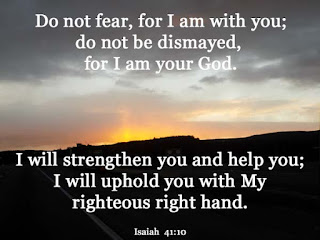Sometimes
when we think God has gotten something all wrong, as I did when He sent us to
Lomalinda, the Bible tells us to look back and remember what God has done. In
fact, the Bible frequently reminds us of the importance of remembering.
Mike
Metzger drives home the point:
“Many
churches have forgotten the premium that the historic Judeo-Christian tradition
placed on remembrance . . . and recalling the right things. The ‘great sin’ of
the Old Testament was forgetfulness (at least it is the most recurrent offense).
‘Remember’ is the most frequent command in the Old Testament.” (Clapham Memo, January 19, 2007, “Back and
Forth,” by Mike Metzger; emphasis mine)
How
sad it is that we are so forgetful.
Ah,
but when we take time to remember what God has done in the past, everything takes
on a new perspective.
Last week I told you my memories of how God so kindly prepared this cowardly
home-body, me, to do the unthinkable, the unfathomable—to move to South America—by
(1) leading me to the public library to learn about Colombia, and (2) leading
me to books Wycliffe missionaries had written and magazines Wycliffe had
published. And as I read, I changed. Through other people’s stories, God helped
me envision myself doing the impossible. They showed me how to do it, in
specific, practical ways. (Read more at “Slow steps of progress wrapped in grace.”)
But
God did even more to prepare me! He choreographed people and circumstances that
brought Marie Goehner into my life. Let me tell
you my memories of that.
Before Dave and I and the kids left the
States for Lomalinda, Harvey and Shirley Strand (my sister-in-law's
parents and also dear friends of our family) invited us to their home to meet their
friend Marie.
Marie had been a nurse in Lomalinda for a few years
but had returned to the States to help her aging parents. She was grieving over
leaving Lomalinda and longed to return.
But while she was home, God continued to use Marie
in significant ways. One of them was to prepare me and my family.
That evening at the Strands’ home, Marie showed us
and our parents slides of Lomalinda and told us many stories. Hearing how much
Marie loved Lomalinda, and seeing photos of homes, geography, and our future
colleagues’ faces helped prepare me mentally, spiritually, and emotionally to move
to Lomalinda.
And listening to Marie was enormously comforting
and helpful for our nervous parents, too. What a gift from God!
Fast-forward a few months: As I struggled to adjust
to living in Lomalinda (that’s putting it mildly—it was really messy at first) gradually
it
became clearer to me that we are God’s workmanship, that He has created
specific things for us to do, and that He prepares them in advance (Ephesians
2:10).
And
He also prepares us. Through Marie, God was gently, lovingly persuading me to
be willing to leave my family and my home—and leave my plain vanilla life—and relocate
in Lomalinda.
And
once there, when I got into trouble, I needed to remember how God had prepared
me to be there.
A man so
different from me, Chuck Swindoll, writes, “Call it the rebel in me, but I
simply cannot bear plain vanilla when life has so many other flavors far more
interesting and tasty. God has so much more in view for all of us. God has
arranged an abundant life for you [John 10:10].”
Chuck
encourages us to “take life by the throat and . . . take the Lord up on His
gracious offer to give you a rich and rewarding life.”
But then he
asks us the big question—he acknowledges the elephant in the room: “Why is that
so hard to embrace?”
“He’s
here for you. He’s in your corner. He wants to pour out His great pleasure on
you—He desires that you live abundantly, joyfully, freely. Why not try living
abundantly, joyfully, and freely for a change? Go ahead . . . I dare you.”
(Charles
R. Swindoll, from Good Morning, Lord . . . Can We Talk?)








